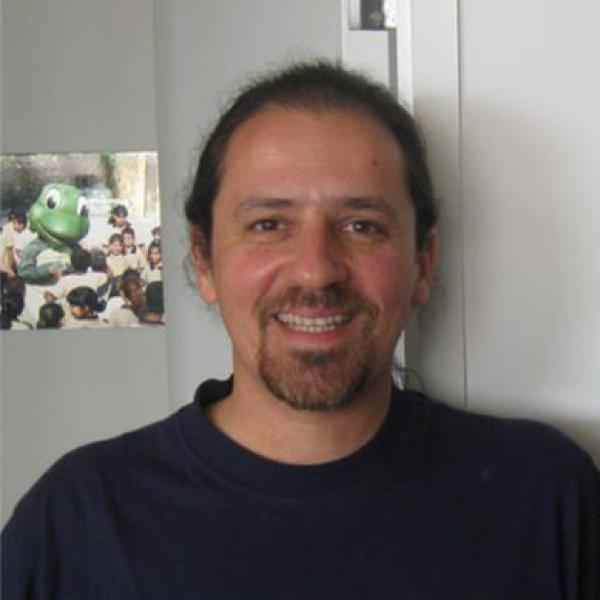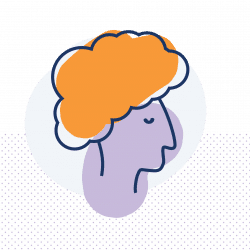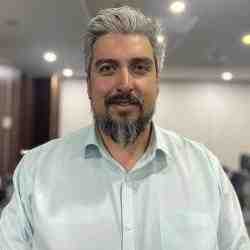Introdução
Germán co-founded the Environmental South Association in 2007 to actively and respectfully reconnect people with nature in the rapidly urbanized cities in Patagonia. Through urbanization, younger generations of Argentinians are separated from a variety of natural environments. With an absence of lakes, parks, and forests there is a disconnect that has formed between the youth and the natural environment, which include plants and animals within them.
In 2004, Germán established the first ever urban nature reserve to counteract the environment degradation caused by the expanding city. His vision from the beginning was to involve the community in a participatory process in the creation and maintenance of these spaces. The stakeholders include members within the political system, social organizations, and schools. Through these “urban nature reserves” German has created pockets of conservation which have become a center for strategies and techniques that enable city dwellers to reconnect with the natural environment. This has led to change in the outlook of the community towards the natural environment.
Germán has created a change in the relationship between the community in these areas and the natural environment. What were once abandoned plots of land with mud and birds have now become sanctuaries for people to reconnect with nature. German reached out to friends and environment conscious individuals which eventually lead to a movement of creating these spaces with a goal of making the cities environment friendly.
In 2007, Germán and a group of friends founded the Environmental South Association. This group works with communities to raise awareness through education. Simultaneously, they are establishing a network of nature conservationists who are determined to spread the concept of urban nature reserves to other cities in Patagonia in both Argentina and Chile.
German believes environmental conservation can only happen when people who live in the city are activated and involved. For German and his team, it was understood that the participatory nature of the processes they have created, needed to be at the center of the framework in order to develop each initiative and create a generation of leaders of change in the environment field.
A nova ideia
Germán co-founded the Environmental South Association in 2007 to actively and respectfully reconnect people with nature in the rapidly urbanized cities in Patagonia. Through urbanization, younger generations of Argentinians are separated from a variety of natural environments. With an absence of lakes, parks, and forests there is a disconnect that has formed between the youth and the natural environment, which include plants and animals within them.
In 2004, Germán established the first ever urban nature reserve to counteract the environment degradation caused by the expanding city. His vision from the beginning was to involve the community in a participatory process in the creation and maintenance of these spaces. The stakeholders include members within the political system, social organizations, and schools. Through these “urban nature reserves” German has created pockets of conservation which have become a center for strategies and techniques that enable city dwellers to reconnect with the natural environment. This has led to change in the outlook of the community towards the natural environment.
Germán has created a change in the relationship between the community in these areas and the natural environment. What were once abandoned plots of land with mud and birds have now become sanctuaries for people to reconnect with nature. German reached out to friends and environment conscious individuals which eventually lead to a movement of creating these spaces with a goal of making the cities environment friendly.
In 2007, Germán and a group of friends founded the Environmental South Association. This group works with communities to raise awareness through education. Simultaneously, they are establishing a network of nature conservationists who are determined to spread the concept of urban nature reserves to other cities in Patagonia in both Argentina and Chile.
German believes environmental conservation can only happen when people who live in the city are activated and involved. For German and his team, it was understood that the participatory nature of the processes they have created, needed to be at the center of the framework in order to develop each initiative and create a generation of leaders of change in the environment field.
O problema
In recent decades, increased urbanization without adequate planning has negatively affected the natural environment and the quality of life of inhabitants in Patagonian cities, found in both Argentina and Chile.
Historically, the population of Argentinian Patagonia was affected by seasonal migrant workers. The permanent rotation of habitants coupled with a general absence of the state, enabled an environment where people did not feel ownership over the land or the community. This left people without a sense of responsibility to maintain their surroundings. In an essence, it was a tragedy of the blue collared worker in this region. Cultural habits such as littering travelled with the migrant workers.
The impact on these sites (in many cases in areas that are ecologically sensitive) is a constant threat. There is the risk of losing an ecosystem which hosts wetlands and fisheries, provides protection from coastal flooding, enables ecotourism, as well as boasts of areas for recreational activities. Needless to say, these vulnerable areas also play host to local biodiversity.
Keeping in mind that almost 80 percent of Latin American populations live in cities, and that the region is developing to be the most urbanized in the world, the community disconnect with the surrounding environment has become a large problem. Moreover, global climate change has aggravated the most vulnerable environmental sectors, making them prone to high water risks, floods and consequences deriving from there.
A estratégia
A large part of Germán’s work is organized through the Environmental Awareness Program COM.UNID.A.D (Understanding Together the Dynamic Environmental Diversity). This program consists of educational activities for school organizations at local and regional levels. The program has four components: 1 – The urban nature reserves system of Rio Gallegos, 2 – The hooded Grebe (a bird native to the region), 3 – Pride campaigns, 4 – Patagonia Austra nature reserves network. From these four components, students develop: neighborhood workshops, educational programs about the environment, pride campaigns, and other public activities with local city participants. Environmental South has a team especially dedicated to developing educational materials, teaching materials, and education activities that include environmental theater, educational walks and trainings for teachers.
In 2015, Environmental South led over 30 trainings. Some of which occurred in reserves, schools, and nurseries, amongst other spaces. The sessions were designed to complement those with varying interests. Examples include: sessions for nature photographers, composters, sessions for kids like ‘guardians of the reserve’, environment and city participation workshops, survey methodologies of Hood Grebe (local bird) for conservationists and volunteers.
In November of 2015, Environmental South launched the Reserve Initiative with teachers and student alumni. The goal of this initiative is to recognize the importance of reserves near school and to learn how to use them as classrooms with open ceilings. Through this initiative they also identified more students who wanted to be part of the organization and help maintain the reserves. Through this process four natural reserves in Rio Gallegos were started and eight different educational institutions helped with the process.
The training workshops and citizen empowerment sessions generated a lot of positivity for the communities. One of communities formed a Young Ecologist group, which worked with a local high school that neighbored, the Urban Nature Reserve, Laguna Maria La Gorda, committed to protecting the wetlands. The group coordinated regular clean-up activities and cultural events in the reserve.
As part of the internal monitoring activities of the Hooded Grebe, members of the Kayakism Yenu Jono organization of RioGallegos were trained to monitor the bird. Children and young people of the organization were also trained and did so, on a weekly basis with lots of enjoyment and commitment.
Germán and his team also work with the interests of particular groups to activate environmental awareness and conservation activities in the nature reserve areas. For example, the Cycling Tourist group “Kosten Aike” was in charge of maintaining the reserves bike paths. The Andean Club of El Chalten maintained the lagoon where it hosted sports and recreational activities.
The approval of the reserves by locals was an important source of support in the advancement of creating other reserves. As a result, in 2009, Germán founded the Urban Nature Reserves Network of Austra Patagonia. This network initially included the following areas along Rio Gallegos: El Carate, Turbio River, 28 de Noviembre and El Chalten in the Santa Cruz province, Rio Grande Province and in the Chilean provinces of Tierra del Fuego and Punta Arenas.
Environmental South has founded a participatory reservation system run by community members, local authorities and NGOs. To generate sustainable financing for the system, the group designed a conservation fund consisting of income coming from private donations, taxes, etc. They plan to pilot the fund in Rio Gallegos and later extend it to other regions.
German believes environmental conservation successfully happens when city inhabitants are activated and involved. For German and his team, it was understood that the participatory nature of the process, needed to be at the center of the framework in order to develop each initiative and create change leaders. In the process, they used public hearings as a method to develop local interests in the Rio Gallegos, Santa Cruz, and in doing so, they established strategic civic interest in three sectors using the media, published books and materials.
Using the same framework as before, Environmental South replicated the initiative in Rio Grande, a Province of Tierra del Fuego, and created an Urban Nature Reserves System with the help of local municipalities. This expansion into the region encompasses El Chalten, Santa Cruz, where the creation of two urban nature reserves were strongly supported by the community. Environmental South also supports similar efforts in Curaco de Vélez, in Chiloé, Chile; which is in the final steps of the formation of creating their first ever Urban Nature Reserve.
German is promoting the coordination between organizations for the inclusion of Nature Reserves and the system of reserves in the developmental strategy of sustainable cities.
A pessoa
From six years old until his youth, Germán was a part of his neighborhood parish of the German Catholic Action of Argentina. This was where he developed his leadership skills and led several community initiatives in nursing homes, children's homes, and rural schools. While studying in college, he made frequent trips with friends to Patagonia, where he visited with communities and schools.
In 1999, German decided to move to the south of Argentina. He found that the natural beauty of the area was extraordinary and at the same time there was a disconnect between such beauty and how locals took care of it. Little by little he begun environmental awareness projects and eventually became part of the Environmental Department of Rio Gallegos Municipality. Before his joining, Environmental issues were only addressed and resolved on a case by case basis. There was no preventive strategy. With Germán joining, he combined the resources in the Rio Gallegos Municipality and joined forces with a local University to create more preventive measures to environmental degradation. In 2004, he founded the first Urban Nature Reserve with the help of local communities.
In 2007, German founded the Environmental South Association in order to have the independence necessary for the development of new programs and advocacy matters. The association is actually part of various networks at the international and national level. Examples of part of the network include, the International Conservation Fund of Canada, Rare, Manomet (Center for Conservation Sciences), U.S. Fish and Wildlife services, Fundación Naturaleza para el Futuro, GEF (Global Environmental Fund) and more.




